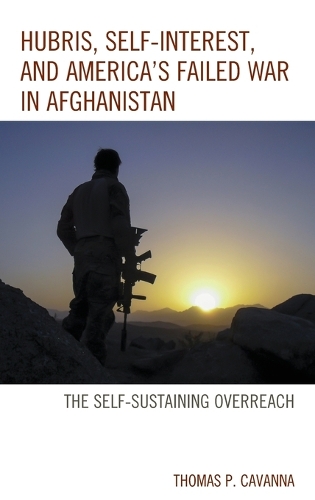
Hubris, Self-Interest, and America's Failed War in Afghanistan: the Self-Sustaining Overreach
(Hardback)
Publishing Details
Hubris, Self-Interest, and America's Failed War in Afghanistan: the Self-Sustaining Overreach
By (Author) Thomas P. Cavanna
Bloomsbury Publishing PLC
Lexington Books
22nd July 2015
United States
Classifications
Professional and Scholarly
Non Fiction
International relations
Terrorism, armed struggle
Nationalism and nationalist ideologies and movements
327.730581
Physical Properties
Hardback
362
Width 162mm, Height 235mm, Spine 29mm
662g
Description
This book describes the conduct of the US-led post-9/11 war in Afghanistan. Adopting a long-term perspective, it argues that even though Washington initially had an opportunity to achieve its security goals and give Afghanistan a chance to enter a new era, it compromised any possibility of success from the very moment it let bin Laden escape to Pakistan in December 2001, and found itself locked in a strategic overreach. Given the bureaucratic and rhetorical momentum triggered by the war on terror in America, the Bush Administration was bound to deploy more resources in Afghanistan sooner or later (despite its focus on Iraq). The need to satisfy unfulfilled counter-terrorism objectives made the US dependent on Afghanistans warlords, which compromised the countrys stability and tarnished its new political system. The extension of the US military presence made Washington lose its leverage on the Pakistan army leaders, who, aware of Americas logistical dependency on Islamabad, supported the Afghan insurgents their historical proxies - more and more openly. The extension of the war also contributed to radicalize segments of the Afghan and Pakistani populations, destabilizing the area further. In the meantime, the need to justify the extension of its military presence influenced the US-led coalition into proclaiming its determination to democratize and reconstruct Afghanistan. While highly opportunistic, the emergence of these policies proved both self-defeating and unsustainable due to an inescapable collision between the US-led coalitions inherent self-interest, hubris, limited knowledge, limited attention span and limited resources, and, on the other hand, Afghanistans inherent complexity. As the critical contradictions at the very heart of the campaign increased with the extension of the latters duration, scale, and cost, Americas leaders, entrapped in path-dependence, lost their strategic flexibility. Despite debates on troops/resource allocation and more sophisticated doctrines, they repeated the same structural mistakes over and over again. The strategic overreach became self-sustaining, until its costs became intolerable, leading to a drawdown which has more to do with a pervasive sense of failure than with the accomplishment of any noble purpose or strategic breakthrough.
Reviews
There are no easy answers to thequestion ofwhy the US-ledinternational engagement in Afghanistan after 2001achieved such modest results.Thisbook explores twoimportantpaths of inquiry:an initialfailureby the Bush Administration toconduct a thorough counter-terroristcampaign focused on Al-Qaedain the early phase, followed in subsequent yearsbya political andstrategic overreach in aregionof enormous complexity. -- Astri Suhrke, Chr. Michelsen Institute, Senior researcher
Author Bio
Thomas Cavanna is lecturer in international relations at the University of Pennsylvania.
